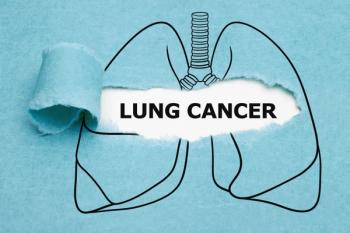
Lung Cancer Screening Leads to Earlier Diagnosis, but Not Overdiagnosis
A study carried out at 4 health care systems found rates of stage I lung cancer increased, and rates of stage IV cancer decreased, once screening was initiated.
Newly released data is adding to the case that
The report,
Corresponding author Anil Vachani, MD, MS, of the University of Pennsylvania, and colleagues, said survival in lung cancer is closely linked with the stage of its detection. Yet, “historically, the majority of lung cancers are diagnosed at a late stage when curative treatment options are expensive and survival probabilities are limited.”
Previous research, including the 2011 National Lung Screening Trial and a Dutch-Belgian trial, have shown that lung-cancer screening of high-risk individuals leads to earlier diagnosis and improved outcomes. Still, Vachani and colleagues said those trials took place largely at centers of excellence, and their study populations tended to be younger and have fewer comorbidities than the real-world population of screening-eligible people.
In the new study, the investigators sought to see how a screening program performed in a well-characterized source population. They tracked patients at 4 health care systems participating in the Population-based Research to Optimize the Screening Process (PROSPR) Lung Consortium between 2014 and 2019. The retrospective analysis examined how low-dose CT screening of high-risk patients affected the stage at which patients tended to be diagnosed, as well as annual age-adjusted lung cancer incidence, the latter of which could help determine whether the program led to overdiagnosis.
In total, 3678 people were diagnosed with lung cancer at the 4 health care systems during the study period. The median age of the cohort was 69 years. Fifty-two percent of the cohort was female, and two-thirds (66%) were non-Hispanic Whites. Sixty-three percent of participants were previous smokers, and 37% were current smokers.
Overall, 404 patients were diagnosed following lung cancer screening. As the volume of screening increased, so too, did the proportion of patients who were diagnosed following screening. By the third quarter of 2019, 1 in 5 patients were diagnosed following screening.
An analysis of patients showed those diagnosed with lung cancer during the study period were diagnosed at earlier stages. Over the course of the study, the incidence of stage I cancers increased by 8%, while the incidence of stage IV cancers dropped by 6%. Overall, 64% of patients with lung cancer were diagnosed at an early stage. At the same time, rates of metastatic lung cancer decreased, and the overall incidence of lung cancer was statistically unchanged.
“This migration to early-stage disease with no change in the overall incidence of lung cancer suggests that implementation of screening was achieving the desired effect of identifying early-stage lung cancers that were destined to progress to more advanced stages of disease, and without resulting in a significant rate of overdiagnosis,” the authors said.
In addition to screening, factors linked with early-stage diagnosis included having a history of extrathoracic cancer or a history of
People with body mass indexes over 30 were also more likely to be diagnosed early, they said.
The authors concluded that even though lower adherence to screening might be an issue in a real-world setting, and despite legitimate concerns about the potential for over-diagnosis, the data suggest screening can play an important role in improving lung cancer outcomes.
“As screening implementation progresses, future population-based studies are needed to assess the impact of screening on other effectiveness outcomes, including rates of harms related to screening and the impact on lung cancer mortality,” they wrote.
Reference
Vachani A, Carroll N, Simoff M, et al. Stage migration and lung cancer incidence after initiation of low-dose CT screening.J Thorac Oncol. Published online August 29, 2022. doi:10.1016/j.jtho.2022.08.011
Newsletter
Stay ahead of policy, cost, and value—subscribe to AJMC for expert insights at the intersection of clinical care and health economics.









